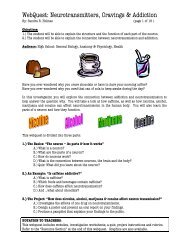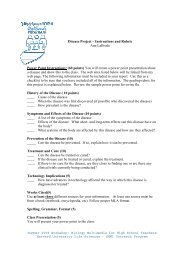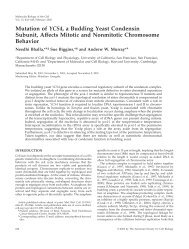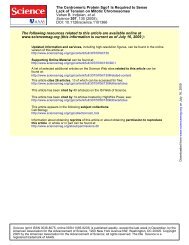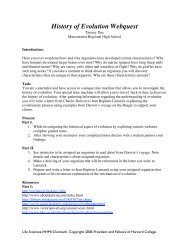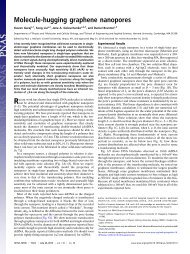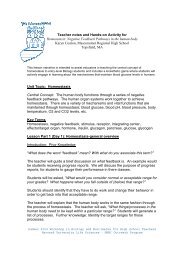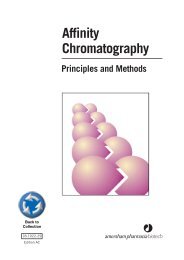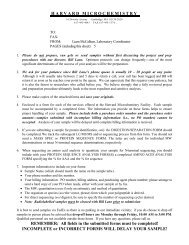Tabletop Rotors and Tubes
Tabletop Rotors and Tubes
Tabletop Rotors and Tubes
Create successful ePaper yourself
Turn your PDF publications into a flip-book with our unique Google optimized e-Paper software.
<strong>Tubes</strong> <strong>and</strong> Accessories<br />
Quick-Seal ® <strong>Tubes</strong><br />
Metal<br />
Spacer<br />
Dome-Top<br />
g-Max<br />
Floating<br />
Spacer<br />
Bell-Top<br />
Heat-sealed Quick-Seal tubes are used in swinging bucket, vertical<br />
tube, near vertical tube, <strong>and</strong> in most fixed angle rotors. Single-use<br />
Quick-Seal tubes are a convenient form of sealable tube; they are<br />
especially useful for the containment of radioactive or pathogenic<br />
samples. There are two Quick-Seal tube designs, dome-top <strong>and</strong><br />
bell-top.<br />
• The bell-top simplifies removal of materials that float during<br />
centrifugation.<br />
• Dome-top tubes hold more volume than their bell-top equivalents.<br />
Detailed information about Quick-Seal tubes is contained in<br />
publication IN-181.<br />
POLYCARBONATE TUBES<br />
Polycarbonate is tough, rigid, nonwettable, <strong>and</strong> glass-like in appearance.<br />
Polycarbonate tubes are used in fixed angle rotors, <strong>and</strong> at least<br />
half full in swinging bucket rotors. Speed reduction may be required<br />
in some rotors if the tubes are not completely filled.<br />
Although polycarbonate tubes may be autoclaved, doing so greatly<br />
reduces the usable life of these tubes. Cold sterilization methods are<br />
recommended. Washing with alkaline detergents can cause failure.<br />
Crazing—the appearance of fine cracks in the tube—is the result of<br />
stress “relaxation” <strong>and</strong> can affect tube performance. These cracks will<br />
gradually increase in size <strong>and</strong> depth, becoming more visible. <strong>Tubes</strong><br />
should be discarded before cracks become large enough for fluid to<br />
escape. These tubes have good tolerance to all gradient media except<br />
alkalines (pH greater than 8). They are satisfactory for some weak<br />
acids, but are unsatisfactory for all bases, alcohol, <strong>and</strong> other organic<br />
solvents.<br />
POLYPROPYLENE TUBES<br />
Polypropylene tubes are translucent <strong>and</strong> are reusable unless deformed<br />
during centrifugation or autoclaving. These tubes have good tolerance<br />
to gradient media including alkalines. They are satisfactory for many<br />
acids, bases, <strong>and</strong> alcohols, but are marginal to unsatisfactory for most<br />
<strong>Tabletop</strong> Ultracentrifuge <strong>Rotors</strong> <strong>and</strong> <strong>Tubes</strong><br />
2-5



